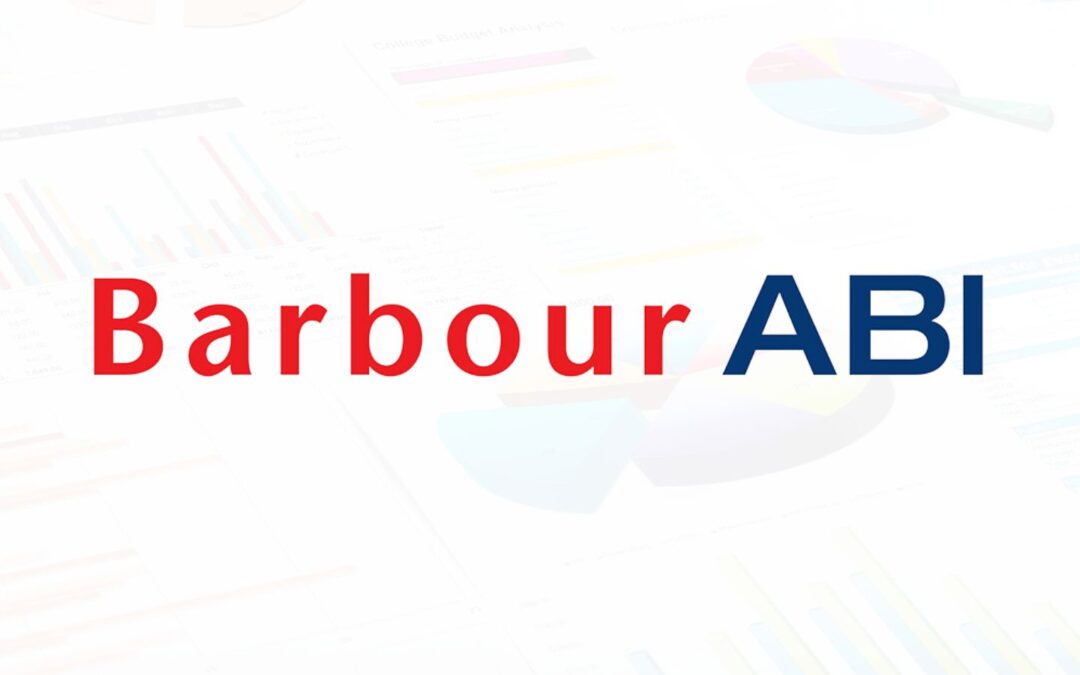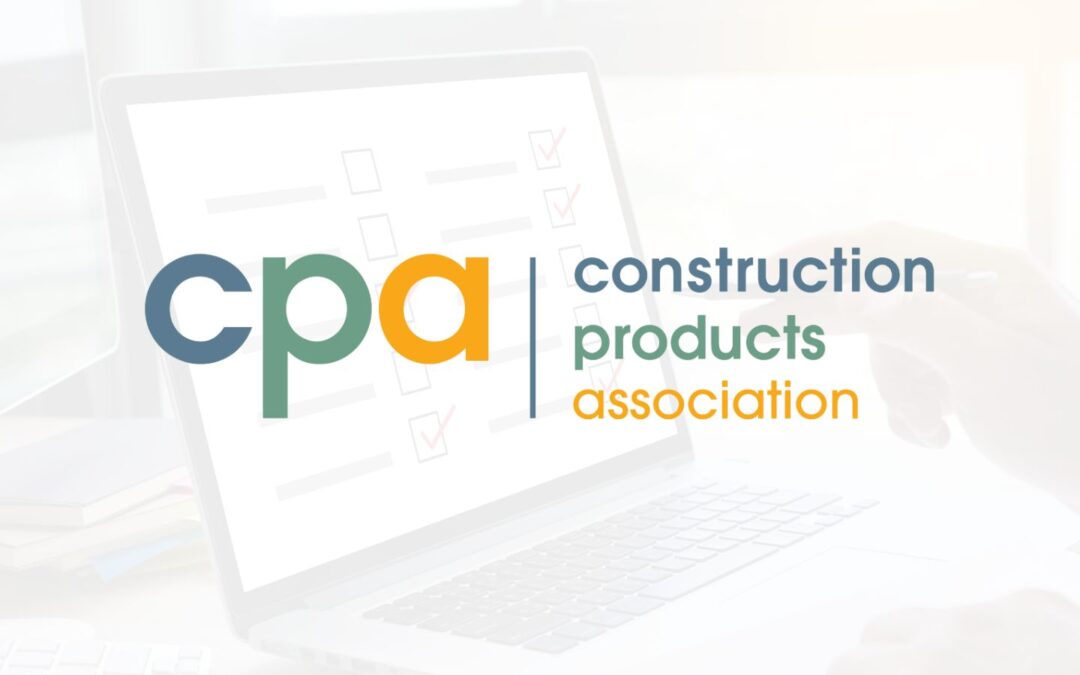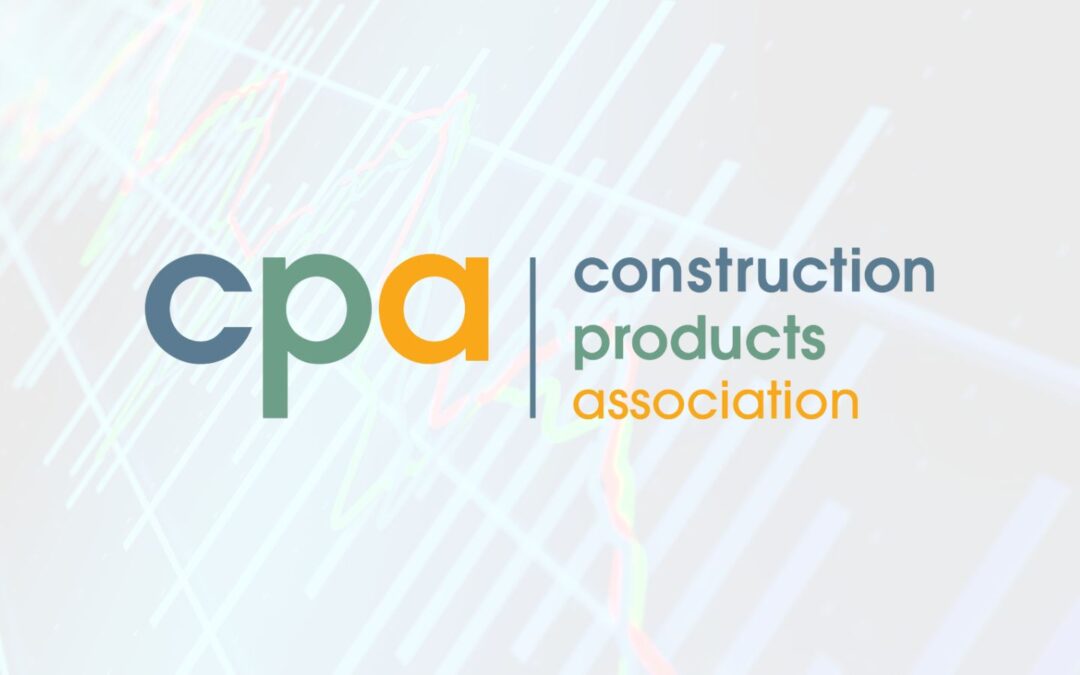
by Oscar Venus | Apr 12, 2024 | Market data
The CPA’s Economic and Construction Update provides an insightful summary of the latest economic and construction trends in the UK. The update covers key indicators such as the CPI inflation and core CPI inflation, UK construction average weekly earnings, UK construction insolvencies, UK house price index, and the UK residential market survey.
The latest weekly update includes
- ONS Construction Output (February 2024)
- ONS UK Construction Materials Price Indices (February 2024)
- DBT UK Brick Deliveries (February 2024)
- RICS UK Residential Market Survey (March 2024)
The update is an excellent resource for anyone interested in the UK construction industry, and the contents page allows readers to easily navigate to the sections that are most relevant to their interests.
In addition to this update, the CPA also publishes Construction Forecasts twice a year. Members can download both the pdf and excel versions of the forecast from the FIS website here. The CPA’s next (Spring) forecasts will be published on Monday 29 April.

by Oscar Venus | Apr 10, 2024 | Skills
Do you have a passion for inspiring and guiding young minds towards a brighter future? Then becoming a part of the Go Construct STEM Ambassador programme could be the perfect opportunity for you!
By participating in their webinar, you’ll gain insight into the work that Ambassadors are already doing, and how you can contribute to this inspiring initiative. You’ll also be introduced to STEM Learning, and have the chance to ask any questions you may have.
On top of that, you’ll receive a step-by-step guide on how to register as a Go Construct STEM Ambassador, and a live sign-up will also be available during the webinar.
Contact Marie Flinter at marieflinter@thefis.org for the link to your preferred session. There are webinars running on:
Thursday 18 April – 10am/11am
Tuesday 21 May – 10am/11am
Don’t miss the chance to make a difference in the Finishes and Interiors Sector

by Oscar Venus | Mar 22, 2024 | Employment, Skills
FIS CEO, Iain McIlwee was a guest at the Government’s Business Connect Conference this week where The Prime Minister announced a reform package to support small businesses.
Key announcements include:
- From 1 April, the Government will fully fund apprenticeships in small businesses by paying the full cost of training for anyone up to the age of 21.
- The amount of Apprenticeship Levy funds that employers can transfer to other businesses will be increased from 25% to 50%.
- The Government will increase the thresholds which determine whether a company qualifies as a small or medium‐sized company by 50% and remove a number of reporting requirements.
- New taskforce to be established to boost private investment in women-led businesses and make the UK the best place in the world to be a female founder.
Prime Minister Rishi Sunak said:
“Whether it’s breaking down barriers and red tape for small businesses, helping businesses hire more young people into apprenticeships and skilled jobs or empowering women to start up their own businesses – this government is sticking to the plan and leaving no stone unturned to make the UK the best place to do business. Taken together, these measures will unlock a tidal wave of opportunity and make a real difference to businesses and entrepreneurs across the country.”
Education Secretary, Gillian Keegan said:
“This Government has built a world-leading apprenticeship system from the ground-up – with apprenticeships now available in around 70 per cent of all occupations. Apprenticeships are a fantastic way for businesses to develop the skills they need, and these new measures will help more businesses and young people benefit from them. Our plan to deliver a high-growth, high-skilled economy is working, with more opportunities available to young people than ever before.”
Secretary of State for Business and Trade Kemi Badenoch said:
“Almost every job in the UK is owed to what is, or what previously was, an SME. They are the engines of economic growth for this country.. Whether it’s through cutting red tape, unlocking investment or lowering business costs, today’s announcements show that this government is committed to doing all it can to turbo-charge SMEs so that they can go further and faster than ever before.”
FIS CEO, Iain McIlwee responded:
“There were some positives to take away from Monday, but I am not convinced that the new apprenticeship fund is a game changer. It does, however, simplify the funding mechanism for apprenticeships – that is a good thing. The focus on women in business is important, but the discussion on finance was sadly quite remote for construction and I am not convinced will bring us anything tangible.
My underlying concern is that we are in election season now, we are getting sweeties and headline grabbing policies when we need vision and a clear plan. We have a failing housing strategy, we have dwindling numbers of trade apprenticeships and finance for construction is in short supply.
Construction is a key enabler and fundamental driver for economic growth. This was a good opportunity to raise questions and encouraging attempt by Government to engage with business discuss SME support, but came up a bit short for me. We need a clear long-term economic strategy that we can buy into and plan around. We also desperately need procurement reform to support SMEs in construction and free up investment”.
FIS CEO Iain McIlwee’s comments at the conference were covered in this Financial Times Article
See the FIS Manifesto for Construction Here

by Oscar Venus | Mar 21, 2024 | Market data
Monthly Construction Update for January
- Construction output is projected to have declined by 0.9% in the three months leading up to January 2024, primarily due to a drop in new work by 4.5%, while repair and maintenance saw an increase of 4.0%.
- The decline in the three-month period was driven by reductions in infrastructure new work and private housing new work, which decreased by 9.3% and 5.2% respectively. Conversely, non-housing repair and maintenance, and private housing repair and maintenance saw positive growth of 3.2% and 3.3%.
- January 2024 witnessed a 1.1% rise in monthly construction output in volume terms, following three consecutive monthly declines, with a recorded value of £15,422 million for January 2024.
- The monthly output increase stemmed from growth in both new work (1.1%) and repair and maintenance (1.2%).
- Across sectors, six out of nine sectors experienced an upturn in January 2024. The primary contributors to this monthly rise were private new housing and non-housing repair and maintenance, showing increases of 2.6% and 1.9% respectively.
Read the full report here.
Download the ONS Construction update here.

by Oscar Venus | Mar 21, 2024 | Market data, Material Shortages
Delivered as part of the Government’s Transforming Construction programme, the Product Platform Rulebook is a shining example of what can be achieved when government and industry come together to drive change. The Rulebook remains one of the Construction Innovation Hub’s most influential outputs and forms a key enabler for the Infrastructure and Projects Authority’s (IPA) Transforming Infrastructure Performance (TIP) agenda. Given such potential, it is critical that government and industry find ways to continue this impact now that the Hub’s initial funded period has now concluded.
In this spirit, we are delighted to announce that the Construction Leadership Council will be taking over the reins of the Product Platform Rulebook in 2024 thanks to our new Industrialised Construction workstream. This work will see the Rulebook revised and re-released in the form of a new ‘Platform Playbook’, setting out a clear path to the adoption of platform approaches for social infrastructure delivery. The group is chaired by Ron Lang, former Chief Technical Officer of the Hub and now Regional Director at AtkinsRéalis.
“The Product Platform Rulebook and the concepts it contains present a logical path to a more industrialised, more productive construction sector. But this work is far from complete, and we continue to learn through our collective experiences of applying these concepts in practice. I am delighted to have the opportunity to lead the next step in its development through the CLC and thank my industry peers for continuing to commit their time and expertise for the collective benefit of our sector.”
The decision to pass the Rulebook over to the CLC for update has been warmly welcomed by leading figures within the former Construction Innovation Hub. The Hub’s Programme Director, Keith Waller, believes the Rulebook still has a powerful role to play going forwards:
“Yet another of the Hub’s output has found a new home to drive forward its legacy. Given that our analysis identified that the adoption of platform approaches in construction could unlock long term productivity gains of up to £7.8bn per annum, I am delighted the CLC will now be using its convening power to ensure these benefits can be achieved.”
Steven Yeomans, former Hub programme lead and now Chief Engineer for Construction at the Manufacturing Technology Centre believes the planned update shows what can be achieved through continuing collaboration:
“As the former lead partner of the Hub, we’ll continue to support this ongoing, transformative work through our participation in the CLC’s Industrialised Construction workstream. In doing so, we can enable the construction sector to address performance and productivity challenges.”
The new Platform playbook is expected to be published for comment in November with a series of supporting activities being planned for 2024. For more information, please contact ron.lang@atkinsrealis.com

by Oscar Venus | Mar 21, 2024 | Employment
The Construction Industry Joint Council (CIJC) has released an updated Promulgation Notice to account for the rises in the National Minimum Wage and National Living Wage starting from April 1st. The General Operative rate will be raised to £11.44 per hour, and the Apprentice rate for 19 to 20-year-olds will be increased to £8.60 per hour.

by Oscar Venus | Mar 21, 2024 | Building Safety Act, Health and Safety
HSE Director of Building Safety, Philip White, has officially announced in a public letter to the industry an extension to the deadline for experienced Building Inspectors in England to finish their competence assessment. Qualified Building Inspectors must meet the following criteria and will now have until July 6 to complete their assessment:
- Current Building Inspectors
- Register as a Class 1 Registered Building Inspector (RBI) by April 6
- Undergoing competency assessment by an approved scheme by April 6
- Not informed by an approved scheme of failing the competency assessment twice
Building Inspectors meeting these conditions can continue their building control duties for the RBI class they are assessed for until July 6, by which they must upgrade their registration to Class 2, 3, or 4. The transitional arrangements are now part of the Code of Conduct for RBIs, and as of March 14, 3,261 Building Inspectors had applied for registration.
The Welsh Government has stated that Building Inspectors in Wales must register by April 6 and now have until September 30 to complete their registration.

by Oscar Venus | Mar 15, 2024 | Skills
Attention FIS Members in Greater Manchester,
Are you interested in NVQ L2 training for your employees or LOSC? DMR, an FIS Approved Training Provider, offers fully funded courses.
- Candidates must be over 19 years old with 2 to 3 years of experience in the relevant trade for the NVQ they choose.
- Candidates must have a Greater Manchester residential postcode.
This qualification will help your employees obtain their Blue Skilled Worker CSCS Card. Keep in mind that grandfather rights will end by the close of 2024.
The Construction Leadership Council is implementing Industry Accreditation changes by 31 December 2024 to ensure a competent and correctly carded workforce.

by Oscar Venus | Mar 15, 2024 | Fairness, Inclusivity and Respect (FIR), Skills
The ‘Fit-Out Futures’ group is a new network being launched by FIS to encourage and empower change by capturing and enhancing the thoughts, ideas and energy of the rising stars and those from diverse backgrounds within the sector. The Group will operate as a dynamic network that connects those from diverse backgrounds and younger people working in the community to share experience and add their insight into the work of FIS.
The group will be a platform for action; looking to harness ideas to help us evolve and ensure that we project a sector that is modern, responsive, inclusive and attractive to work in. Ultimately the programme will be determined by the group, but initially FIS Team will organise a number of meetings and events (physical and online) throughout the year. Anyone wishing to join the Fit-Out Futures group should contact Michelle Armstrong
How the network will work:
How will we get things going
To kick things off we will host an initial round table meeting, drawing together key individuals from across the supply chain. The aim of this meeting will be to introduce the concept of the Working Group and give those joining an opportunity to raise your ideas for shaping the future with like-minded people intent on making a difference.
Group Objectives:
- Create a network that connect those from diverse backgrounds and help individuals improve their networks
- To help promote and amplify positive initiatives and get the weight of FIS behind them
- Ensure all voices in our community are heard and FIS activity reflects their needs
- To be custodians of the FIS Respect Policy and ensure FIS events are designed to support all in the community
- Tap into new perspectives to confront challenges and drive change
- Harness ideas to support sector recruitment, school and college engagement etc

by Oscar Venus | Mar 15, 2024 | Contractual and Legal
Director of Building Safety for HSE, Philip White, has today written to the Building Control industry outlining new transitional arrangements for the registration of building control inspectors in England.
The Building Safety Regulator has listened to the concerns raised by the profession, including the potential impact on the construction industry if there are not enough inspectors registered to practice by the legal deadline.
It is crucial these concerns are balanced with the requirement for BSR to implement the Building Safety Act, 2022 and the need to raise standards in the profession; it is also important to remember that these changes were introduced in the wake of the Grenfell Tower tragedy.
A competence assessment extension period of 13 weeks will be introduced from 6 April to 6 July 2024 to enable those who meet specific criteria to continue to operate. This is not an opportunity to delay completing registration as an RBI and there will be no extension to these arrangements.
BSR has seen a positive response to the changes among the profession and it is encouraging to see a large number of people already engaging with the process. As of today (14 March) 3,261 professionals have started their applications to register.
In line with BSR’s enforcement policy statement and the principles of proportionate regulation, BSR will target its regulatory activity at those who present the greatest risk, particularly those who are not engaging with the new regulatory regime.
Open letter to Building Control professionals – March 24
Letter from the Director of Building Safety to industry:
Dear colleague,
As you will be aware, a number of concerns have been expressed by the building control profession about whether enough building control professionals will be registered as RBIs by 6 April.
I understand those concerns and have been working with colleagues in BSR and across government to consider what we can do to support the profession. To that end, the decision has been taken to implement a competence assessment extension period for those meeting set criteria.
Professionals who are not registered by 6 April will not benefit from the extension period and will not be able to continue to work on regulated building control activities.
Experienced building control professionals who are not trainees but have not yet completed a competence assessment will have the scope of their registration temporarily extended provided they meet the following criteria:
Temporary Class 1 Registration Extension Criteria:
- They are an existing building control professional;
- They are registered as a Class 1 RBI by 6 April 2024;
- They are enrolled in, and in the process of having their competency assessed through, one of the BSR approved competency assessment schemes by 6 April 2024. These are: cbuilde.com, www.thebscf.org, www.ttd-education.org; and
- A scheme provider has not told them that they have not passed their competency assessment for a second time
Those who meet the above criteria will be allowed a period of 13 weeks from 6 April 2024 to 6 July 2024 to complete their competency assessment and upgrade their registration to Class 2 or 3 (and 4, if applicable).
During this period, the scope of their registration will be temporarily extended, and they can continue to undertake building control work for the class of RBI for which they are undertaking a competency assessment.
Those who meet the criteria but do not successfully complete a competency assessment and upgrade their registration class by 6 July will not be able to continue to undertake regulated building control activities.
More detail on the transitional arrangements can be found here: https://www.hse.gov.uk/building-safety/building-control/codes-standards.htm
This must not be seen as an opportunity to delay – there will be no extension to these arrangements. From 6 July 2024 any professionals who have not completed a competency assessment and upgraded their registration class will only be able to undertake work under supervision.
We expect employers to support staff going through the assessment process by ensuring they have time to complete the assessment process and providing assistance and support to help them to succeed.
I encourage everyone who has not yet done so to register with BSR and enrol with one of the competency assessment schemes as soon as possible.
Philip White
Director of Building Safety, HSE

by Oscar Venus | Mar 15, 2024 | Main News Feed
FIS has partnered with Barbour ABI to extend its reach, educate and take our content directly to specifiers and building designers. This also enables members to extend their presence on Barbour ABI through the FIS Specialist Interiors Hub and access discounts on core services available from Barbour ABI. FIS regularly shares content from its online platform SpecFinish which is added to the Specialist Interiors Hub.

by Oscar Venus | Mar 8, 2024 | Market data
If you’re a main contractor who is employing a sub-contractor through an intermediary, such as their own limited company, familiarity with the interaction between off-payroll rules (IR35), and the Construction Industry Scheme (CIS), is crucial, and so is an understanding of when the VAT reverse charge applies. This information sheet has been prepared by the JCT to help FIS members understand the interaction between CIS and IR35.

by Oscar Venus | Feb 22, 2024 | Membership
Staying updated on FIS activities can be challenging. Consider enabling notifications on LinkedIn for FIS content to receive updates about important industry issues that affect your business and related FIS guidance, as well as notifications, member benefits, our events and other activities.
To help us to stand out in the noise that is social media, have you considered enabling notifications on your LinkedIn account for FIS content? We understand if you prefer not to receive frequent updates, and we assure you that we limit our posts to three times a day (excluding award announcements) to avoid overwhelming you. By doing this, you can stay informed about award opportunities, upcoming events, and ways to contribute to your trade association’s direction.
Simply click on the bell icon at the top right of our LinkedIn page and select your preferred notification settings.

by Oscar Venus | Feb 16, 2024 | Main News Feed
This consultation outlines several proposed changes to permitted development rights:
- To enhance flexibility for homeowners in accommodating growing families and maximizing the potential of their current residences, we are considering various adjustments to these rights. These changes aim to allow larger extensions and grant more freedom to construct outbuildings.
- To support the construction of new homes, we are exploring the possibility of amending existing upward building rights to broaden the range of buildings eligible for these rights. Additionally, we are seeking input on modifying the demolition and rebuild right to expand the types of buildings that can benefit from it and permit larger rebuild footprints.
- In order to provide increased flexibility for households and businesses interested in installing electric vehicle charging stations, we are considering several alterations to the relevant rights. Feedback is being sought on whether permitted development rights should encompass units necessary for the operation of electric vehicle charge points, such as equipment housing or storage cabinets. We are also seeking input on revisions to the permitted development right for air source heat pumps, including a review of the requirement that they must be at least 1 meter from the property boundary.

by Oscar Venus | Feb 16, 2024 | Main News Feed
From 6 April, all building-control professionals must pass a competence assessment and register with the Building Safety Regulator (BSR), a division of the Health and Safety Executive (HSE). Lorna Stimpson, the chief executive of Local Authority Building Control (LABC,) has warned that this could mean that a considerable number of councils are at risk of discontinuing building-control services from April, unless the deadline for proving professional competence is extended.
In a significant move, she has urged senior officials at the HSE, the Department for Levelling Up, Housing and Communities (DLUHC), and the Welsh Government to postpone the competence assessment deadline by six months for a smoother transition. She cautioned in a letter that many building-control professionals might not attain certification before the deadline, leading to “a significant number of authorities” in England and Wales being unable to carry out building control.
According to Stimpson, the absence of registered building inspectors in a local authority would have broad repercussions on the construction industry, consumers, regulatory enforcement, and compliance. She states that the profession has had insufficient time to grasp the new requirements, with numerous surveyors yet to apply for registration or competence testing and also expressed concerns about the mental health impact on staff at the independent assessor bodies, with building control professionals experiencing a high level of stress due to the deadline.
She suggested that building surveyors should adhere to the BSR’s codes of conduct from 6 April and be enrolled in an independent assessment scheme, working towards certification by the revised deadline.
FIS chief executive Iain McIlwee said: “This is undoubtedly a concern for all in the supply chain as delays can be expensive and disruptive. We urge all members to pay careful attention to their contracts and any liabilities associated with delay that could be imposed on them and encourage Government to heed the warnings of the LABC who are working closely with their local authority members to ensure that political ideology is matched to practical considerations and that we are all working together to deliver a safer and better culture in the construction sector supported by effective regulation and pragmatic, but robust enforcement.”

by Oscar Venus | Feb 16, 2024 | Market data
The recent publication of the CPA’s State of Trade Survey Q4 2023 revealed a continued decrease in construction product sales for manufacturers in the previous year. This marks the sixth consecutive quarter of decline for heavy side manufacturers and the second decrease for those on the light side. Looking ahead, manufacturers predict a further decline in sales over the next 12 months, expressing worries about the anticipated weak demand in 2024.

by Oscar Venus | Feb 16, 2024 | Awards, Main News Feed
The excitement is mounting as the judging process for the 2024 FIS Contractor Awards is now underway. Our judges are traveling across the country to inspect the remarkable projects submitted by our members.
These awards shine a spotlight on excellence within the finishes and interiors sector, with a goal of motivating and acknowledging exceptional craftsmanship. The Awards Lunch, a much-anticipated event, guarantees an afternoon of recognition, camaraderie, and opportunities for industry professionals to network and share insights.
You can take a look at our Project Library which details the remarkable projects that our members complete. You can access comprehensive case studies for each project, detailing the scope of works, products used, contract budgets and locations.
Tickets are now on sale for the Awards Lunch, which will be held on 6 June at the Royal Lancaster Hotel in London. The winners of the 2024 Awards will be announced and presented by our guest speaker Shaparak Khorsand.

by Oscar Venus | Feb 16, 2024 | Market data
The CPA’s weekly Economic and Construction Update provides an insightful summary of the latest economic and construction trends in the UK.
The CPA’s weekly Economic and Construction Update offers a comprehensive overview of the current economic and construction trends in the UK, including key indicators like CPI inflation, core CPI inflation, UK construction average weekly earnings, UK construction insolvencies, UK house price index, and the UK residential market survey. This resource is valuable for individuals keen on the UK construction sector, with a user-friendly contents page for easy navigation to specific sections of interest.
In the latest report, it is evident that CPI Inflation and Core CPI Inflation for January 2023 have shown moderate increases, reflecting the current economic climate. The ONS Construction Output data for December 2023 indicates steady growth in the sector, with promising signs for future developments. Additionally, the ONS Construction New Orders for Q4 of 2023 demonstrate a positive outlook for upcoming projects within the construction industry.
Moreover, the ONS UK Construction Employment figures for the same period reveal stable employment rates, highlighting the industry’s resilience and ability to provide job opportunities. On another note, the Insolvency Service UK Construction Insolvencies data for December 2023 shows a decrease in insolvencies, indicating a more robust financial landscape for construction companies.
Lastly, the ONS UK House Price Index for December 2023 presents an overview of the housing market, showcasing trends and fluctuations in property prices. Overall, the comprehensive update provides valuable insights into various aspects of the construction and housing sectors, offering a glimpse into the current state of the UK economy.

by Oscar Venus | Feb 16, 2024 | Main News Feed
BABR, a long-established cash flow solutions business, is delighted to join the FIS as their trusted Finance Partner. Members will benefit from a dedicated helpline, where free, no obligation support and guidance will be available for your financial quandaries.
Working with the FIS and its members, BABR will inform and educate with insightful content on financial topics for SpecFinish trade magazine and in webinars run at regular intervals through 2024, the first of which is planned for 17th April 2024 – Webinar: Risk to Resilience – cashflow, funding and recovery options – FIS (thefis.org)
Find out more about BABR here

by Oscar Venus | Feb 9, 2024 | Drylining, Main News Feed
SkillBuild, delivered by CITB, is the largest multi-trade skills competition in the UK for construction trainees and apprentices.
Registration for regional heats is now open. Categories include Plastering and Drylining (previously Plastering and Drywall).
FIS will be attending and is encouraging members to get behind the regional heats to support the competition and use these opportunities to engage with local schools and colleges. Our aim is to ensure key interior trades such as Drylining, Plastering and Carpentry and Joinery have a strong presence in the competition and we use the opportunity that SkillBuild provides to promote the sector.
Having attended the 2023 SkillBuild finals, the excitement and motivation in the room of all the participants was inspiring.
The SkillBuild competition offers an opportunity for talented apprentices and learners of all ages to compete regionally against one another in various trade categories.
SkillBuild offers many benefits for employers and training providers, such as:
- Showcase the quality of your training programmes through success in competitions
- Highlight your organisations commitment to raising standards in work-based learning.
- Boost your long-term business performance
More information on the competition including locations can be found here: SkillBuild | Go Construct
If you’re interested in coming to SkillBuild, or for any other Skills and Training queries, please get in touch with our Skills Team – Beena beenanana@thefis.org or Marie marieflinter@thefis.org






















